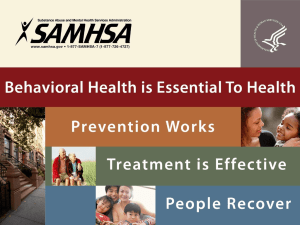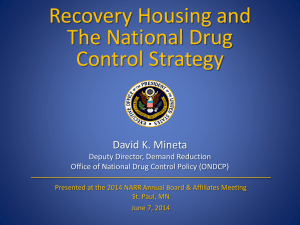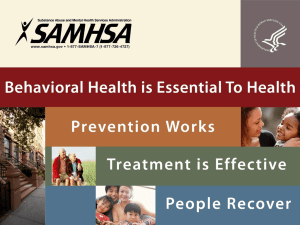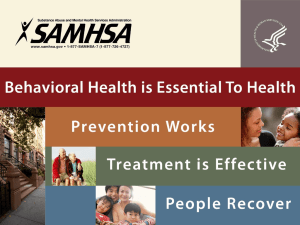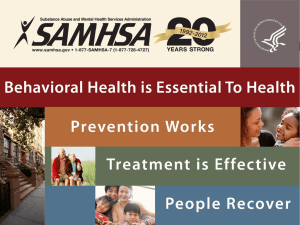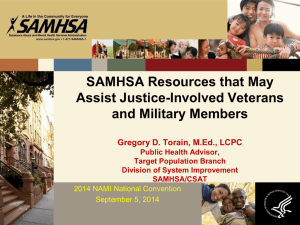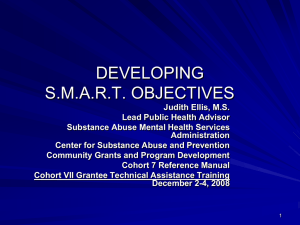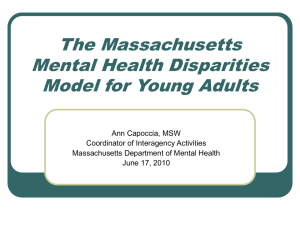MI CC Handout 5 Resources and Research_VG
advertisement
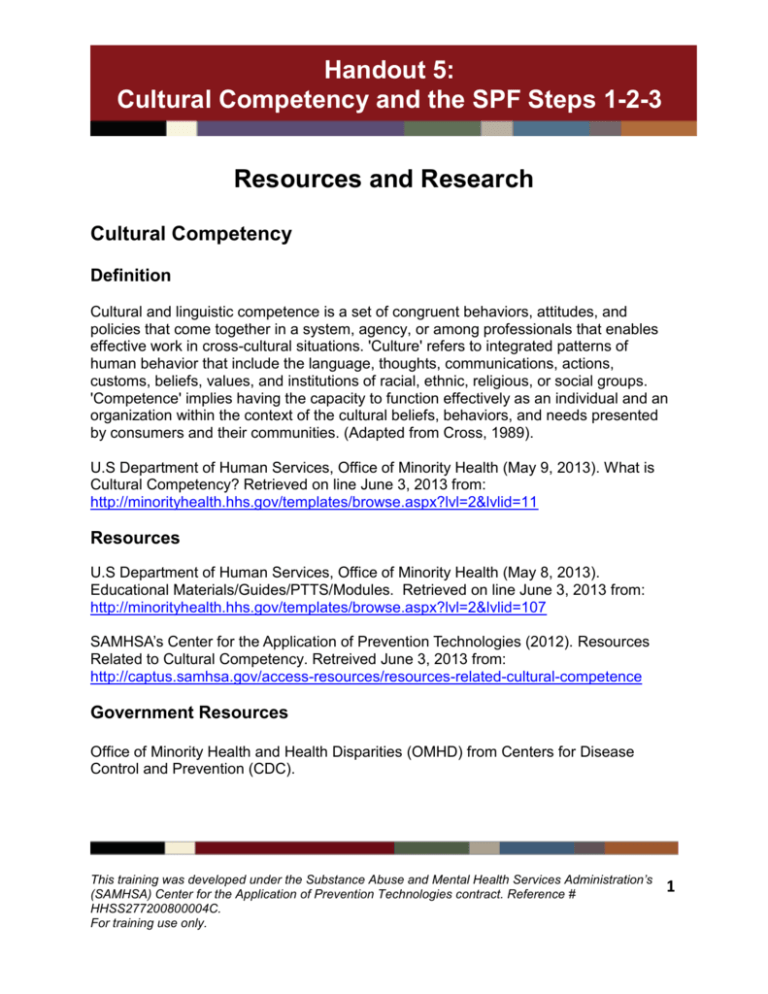
Handout 5: Cultural Competency and the SPF Steps 1-2-3 Resources and Research Cultural Competency Definition Cultural and linguistic competence is a set of congruent behaviors, attitudes, and policies that come together in a system, agency, or among professionals that enables effective work in cross-cultural situations. 'Culture' refers to integrated patterns of human behavior that include the language, thoughts, communications, actions, customs, beliefs, values, and institutions of racial, ethnic, religious, or social groups. 'Competence' implies having the capacity to function effectively as an individual and an organization within the context of the cultural beliefs, behaviors, and needs presented by consumers and their communities. (Adapted from Cross, 1989). U.S Department of Human Services, Office of Minority Health (May 9, 2013). What is Cultural Competency? Retrieved on line June 3, 2013 from: http://minorityhealth.hhs.gov/templates/browse.aspx?lvl=2&lvlid=11 Resources U.S Department of Human Services, Office of Minority Health (May 8, 2013). Educational Materials/Guides/PTTS/Modules. Retrieved on line June 3, 2013 from: http://minorityhealth.hhs.gov/templates/browse.aspx?lvl=2&lvlid=107 SAMHSA’s Center for the Application of Prevention Technologies (2012). Resources Related to Cultural Competency. Retreived June 3, 2013 from: http://captus.samhsa.gov/access-resources/resources-related-cultural-competence Government Resources Office of Minority Health and Health Disparities (OMHD) from Centers for Disease Control and Prevention (CDC). This training was developed under the Substance Abuse and Mental Health Services Administration’s (SAMHSA) Center for the Application of Prevention Technologies contract. Reference # HHSS277200800004C. For training use only. 1 Office of Minority Health from the Department of Health and Human Services: The National Standards for Culturally and Linguistically Appropriate Services in Health and Health Care (CLAS): https://www.thinkculturalhealth.hhs.gov/Content/clas.asp Health Resources and Services Administration (HRSA) cultural competence site resources for health care providers. Indian Health Service (IHS), see also the IHS pages on health promotion and disease prevention. National Center on Minority Health and Health Disparities. Healthfinder a Federal website developed by multiple agencies. Limited English Proficiency. Let Everyone Participate -- LEP.gov has information on implementation of Executive Order 13166 regarding language access to federal and federally assisted programs. Setting the Agenda for Research on Cultural Competence in Health Care, from the Agency for Healthcare Quality and Research. Centers for Disease Control and Prevention, National Prevention Information Network. National Center for Cultural Competence (NCCC). The mission of the NCCC is to increase the capacity of health care and mental health care programs to design, implement, and evaluate culturally and linguistically competent service delivery systems to address growing diversity, persistent disparities, and to promote health and mental health equity. The NCCC provides national leadership and contributes to the body of knowledge on cultural and linguistic competency within systems and organizations. Major emphasis is placed on translating evidence into policy and practice for programs and personnel concerned with health and mental health care delivery, administration, education and advocacy. http://nccc.georgetown.edu/index.html Health Equity in Michigan: A Toolkit for Action, Fact Sheet on Data. Available online at: http://www.michigan.gov/documents/mdch/Data_Factsheet_410692_7.pdf Michigan Health Equity Data Project, Michigan Health Equity Data Tables and Related Technical Documents (2011) Available online at: http://www.michigan.gov/documents/mdch/MI_Health_Equity_Data_Tables__May_2011_361868_7.pdf This training was developed under the Substance Abuse and Mental Health Services Administration’s (SAMHSA) Center for the Application of Prevention Technologies contract. Reference # HHSS277200800004C. For training use only. 2 SAMHSA Center for Behavioral Health Statistics and Quality, National Surveys on Drug Use and Health (NSDUH), NSDUH Special Report (May 14, 2013). Need for and Receipt of Substance Use Treatment among Asian Americans and Pacific Islanders. Retrieved June 3, 2013 from: http://www.samhsa.gov/data/2k13/NSDUH125/sr125aapi-tx.htm SAMHSA Center for Behavioral Health Statistics and Quality, National Surveys on Drug Use and Health (NSDUH), NSDUH Special Report (February 21, 2013). Need for and Receipt of Substance Use Treatment among Blacks. Retrieved June 3, 2013 from: http://www.samhsa.gov/data/2k13/NSDUH124/sr124-african-american-treatment.htm SAMHSA Center for Behavioral Health Statistics and Quality, National Surveys on Drug Use and Health (NSDUH), NSDUH Special Report (November 2012). Need for and Receipt of Substance Use Treatment among American Indians and Alaskan Natives. Retrieved June 3, 2013 from: http://www.samhsa.gov/data/2k12/NSDUH120/SR120treatment-need-AIAN.htm SAMHSA Center for Behavioral Health Statistics and Quality, National Surveys on Drug Use and Health (NSDUH), NSDUH Special Report (April 14, 2011). Differences and Similarities between Urban and Rural Outpatient Substance Abuse Treatment Facilities. Retrieved June 3, 2013 from: http://www.samhsa.gov/data/2k11/NSSATS242/sr242-treatment-facilities-urbanrural.htm SAMHSA Center for Behavioral Health Statistics and Quality, National Surveys on Drug Use and Health (NSDUH), NSDUH Special Report (October 4, 2011). Substance Use among Hispanic Adolescents. Retrieved June 3, 2013 from: http://www.samhsa.gov/data/2k11/WEB_SR_007/WEB_SR_007.htm SAMHSA Center for Behavioral Health Statistics and Quality, Drug Awareness Network (DAWN), DAWN Report (May 12, 2011). Trends in Emergency Department Visits for Drug-Related Suicide Attempts among Females: 2005 and 2009. Reterieved June 3, 2013 from: http://www.samhsa.gov/data/2k11/DAWN011/DrugRelatedSuicide.htm Substance Abuse & Mental Health Services Administration (March 2012). Publications Ordering Top Health Issues for LGBT Populations; information and resource kit. Retrieved May 30, 2013 from: http://store.samhsa.gov/product/Top-Health-Issues-for-LGBT-Populations/SMA12-4684 Social Determinents of Health This training was developed under the Substance Abuse and Mental Health Services Administration’s (SAMHSA) Center for the Application of Prevention Technologies contract. Reference # HHSS277200800004C. For training use only. 3 US Department of Health and Human Services, Office of Desease Prevention and Health Promotion (October 26, 2010). Healthy People 2020: An Opportunity to Address Societal Determinants of Health in the United States. Secretary’s Advisory Committee on National Health Promotion and Disease Prevention Objectives for 2020: An Opportunity to Address the Societal Determinants of Health in the United States,July 26, 2010. Retrieved June 3, 2013 from: http://www.healthypeople.gov/2010/hp2020/advisory/societaldeterminantshealth.htm World Health Organization, Commission on Social Determinants of Health. Closing the Gap in a Generation: Health equity through action on the social determinants of health. Available from: http://www.who.int/social_determinants/en Cultural Competency Research U.S Department of Human Services, Office of Minority Health (June 22, 2009). Research. Retrieved on line June 3, 2013 from: http://minorityhealth.hhs.gov/templates/browse.aspx?lvl=1&lvlID=31 Adverse Childhood Experiences Reducing Adverse Childhood Experiences Course – ACE Course Family Policy Council (2012). Reducing Adverse Childhood Experiences Course. Available on-line at: http://www.fpc.wa.gov/acecourse.html This online course will cover brain science, the Adverse Childhood Experiences (ACE) Study, and resilience research. You will learn the prevalence and high cost lifelong outcomes of ACEs, the vital role of culture and community to optimize wellbeing, and how to use this emerging research to create transformative conversations. Preview the course. This course has been developed by the Washington State Family Policy Council and is presented in partnership with the Washington State Department of Social and Health Services. The content has been developed over the last decade with the research and wisdom of many extraordinary partners from diverse disciplines including biopsychiatry, clinical and community psychology, cultural anthropology, education, public health, social work, and sociology. It is made possible by their collective passion, persistence and vision. This training was developed under the Substance Abuse and Mental Health Services Administration’s (SAMHSA) Center for the Application of Prevention Technologies contract. Reference # HHSS277200800004C. For training use only. 4 The full course takes a minimum of three and a half hours to complete. You will create your own user name and password allowing you to move through the course at your own pace. A certificate of completion is generated at the end of the course. As of September 2012 individual registration is $39. There is an additional cost for clock hours and CEUs. Adverse Childhood Experiences (ACEs) Research Morbidity and Mortality Weekly Report (MMWR) - Adverse Childhood Experiences Reported by Adults -- Five States, 2009; Weekly, December 17, 2010 / 59(49);16091613. Retrieved May 9, 2013 from: www.acestudy.org Koss, M., Polacca, M., Yuan N., et al “Adverse Childhood Exposures and Alcohol Dependence Among Seven Tribes” American Journal of Preventative Medicine, 2003, pp. 238‐244 This training was developed under the Substance Abuse and Mental Health Services Administration’s (SAMHSA) Center for the Application of Prevention Technologies contract. Reference # HHSS277200800004C. For training use only. 5
